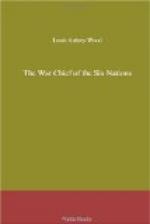Meanwhile, how was it faring with the tribesmen of the Six Nations who had remained in their former territories east of the Niagara? They were anxious to come to terms with the government of the United States, but not by themselves alone. In any treaty which might be made, they wished the concurrence of the western tribes. The officials of the new republic were, however, opposed to this and treated their desire with scant courtesy. In 1784 a conference was called at Fort Stanwix, but the western tribes were not invited to come. While this was taking place, Red Jacket, the Seneca orator, rose in the company of his fellows and uttered a speech burning with eloquence. His attitude towards the Americans had undergone a change since Brant had undone his treachery before the war had closed. The Six Nations should renew the contest, said Red Jacket. Never should they submit to the yoke of their oppressors. On the other hand, Chief Cornplanter, with sounder judgment, argued for peace. It would surely be an unwise thing for the Indians to enter upon a fresh war single-handed, and without the assistance of their former allies, the English.
At length Cornplanter had his way, and on October 22 a treaty was made with the representatives of the United States. By this treaty the Indians were to give up all the prisoners of war still in their hands. Until this was done, six hostages were to be furnished from among their number. At the same time, the boundaries of the country over which they held sway were defined.
Loud murmurs of complaint arose within the Six Nations on the completion of this pact, and no one was more angry than Joseph Brant himself. He was at Quebec, on the point of leaving for England, but he hurried back on learning the terms of the treaty. He was especially exasperated because Aaron Hill, one of the lesser chiefs of the Mohawks, was to be given up as a hostage. Arriving at Cataraqui, Brant, on November 27, sent a long and stirring letter to Colonel Munroe. In this he showed that his Indians were in no way to blame for the retention of prisoners of war. The fight was over, and the Six Nations wanted harmony restored. With considerable feeling, he referred to the ‘customs and manners of the Mohawks.’ ‘They are always active and true,’ he protested; ’no double faces at war or any other business.
The difficulty was quickly righted and the War Chief satisfied, but he saw that all the Indian races were in a precarious position and might, sooner or later, be drawn into hostilities. Meanwhile he was meditating a scheme which might be likened to the bold conception of Pontiac. In vision he saw all the Indian tribes united into one far-reaching confederacy for the assertion of their liberties. Brant was of a singularly ambitious disposition and had no humble idea of his own capacities. He pictured himself as the chosen head of such a vast league of the native races. It was with this in view that at this very time he paid a visit to the western tribes and sought to ascertain their ideas upon the subject.




